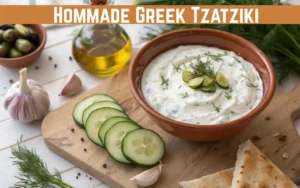Greek culture is deeply intertwined with celebration, and desserts are at the heart of nearly every holiday and family gathering. From the warm aromas of Christmas cookies to the ceremonial cutting of vasilopita on New Year’s Day.
Greek festive desserts carry centuries of symbolism, tradition, and flavor. In this article, you’ll discover the most beloved Greek sweets served during key holidays and special events. or Return to the Ultimate Guide to Greek Desserts to explore dessert traditions across Greece
Table of Contents
Greek Desserts for Easter
Easter is the most important religious holiday in Greece, and its sweets reflect that reverence. After a 40-day Lenten fast, many Greeks celebrate with rich, buttery desserts.
- Tsoureki: A sweet, braided bread flavored with mahlab and mastic. Sometimes decorated with red-dyed eggs.
- Galaktoboureko: Syrup-soaked custard pie often served on Easter Sunday.
- Koulourakia: Vanilla-scented butter cookies twisted into braids and often topped with sesame.
Christmas Favorites
Greek Christmas is a time for baking in abundance, especially with cinnamon, honey, and walnuts.
- Melomakarona: Eggless, orange-zest cookies soaked in honey syrup and topped with crushed walnuts.
- Kourabiedes: Snowy white almond shortbread cookies dusted generously with powdered sugar.
- Diples: Thin sheets of dough rolled and fried, then covered in honey syrup and sprinkled with nuts.
Wedding and Name-Day Sweets
Greek weddings and name days are festive, large gatherings where desserts are both celebratory and symbolic.
- Amygdalota: Almond-based soft cookies or balls, symbolic of purity and affection.
- Pasteli: Sesame and honey bars served at casual name-day gatherings and receptions.
- Baklava: While also served year-round, baklava is a centerpiece sweet at weddings and family events.
Discover more seasonal treats in our Festive Greek Desserts Collection
Symbolism in Greek Festive Sweets
Many Greek desserts served during holidays are more than just treats—they symbolize health, prosperity, and family unity.
- Red eggs in tsoureki: Resurrection and rebirth
- Vasilopita coin: Luck and blessings for the new year
- White powdered cookies (kourabiedes): Purity and joy
Recipe Highlights for Each Event
Each dessert has its place in the calendar:
- January: Vasilopita
- April (Easter): Galaktoboureko, Koulourakia
- December (Christmas): Melomakarona, Kourabiedes, Diples
- Year-round: Baklava, Amygdalota, Pasteli
Frequently Asked Questions
What are traditional Greek Christmas desserts?
Melomakarona, kourabiedes, and diples are the most iconic.
Which sweets are used in weddings?
Baklava, amygdalota, and sometimes sugared almonds or loukoumi.
Can these be made vegan or gluten-free?
Many can be adapted, especially melomakarona (which is naturally eggless) and pasteli (which contains no flour).
Learn how to make Authentic Greek Baklava for your celebration





1 thought on “Best Greek Desserts for Holidays and Celebrations”
Comments are closed.